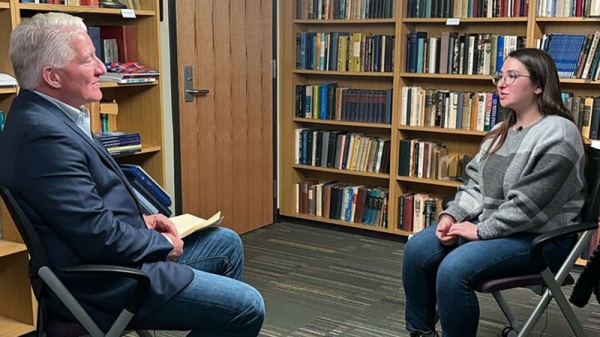‘Remote work is for everybody’: Full-time digital nomad explains why coworking is the future

Ben Marks is an impact entrepreneur, campaigner and writer, currently serving as the Founder & Executive Director of the #WorkAnywhere campaign.
Life on the road can be lonely – and loneliness is a silent killer. It’s linked to heightened risk of heart disease, stroke, dementia and high blood pressure.
According to the Campaign to End Loneliness website, it is worse for you than obesity or smoking 15 cigarettes a day.
For digital nomads like me, loneliness comes with the many territories we visit. Always on the move, we can miss out on the fixed social ties that are so important to a person’s wellbeing.
But digital nomad influencers have helped me a lot. I once saw NFT advisor Olumide Gbenro open up about having suicidal thoughts when he first went travelling, brought on by a profound sense of being alone.
Inspired by Olumide, I wanted to facilitate solutions that deepen the human bonds everyone needs – as a nomad myself. I’ve found that the movement is at its best when you integrate community living into your working life.
Now, as our broader society experiences a loneliness epidemic, I believe we should all turn to communities to feel a sense of belonging away from home.
Building a community wherever you are
Coworking spaces may have started as something purely practical, but they’re evolving fast.
The coworking concepts which are developed by and for digital nomads are the ones you want to look for. These optimise for social fulfillment at every layer of their design and operation.
My preferred term here is ‘community-workspace’.
One of the best examples of the community-workspace model is seen in the ‘Digital Nomad Village’ phenomenon that has grown exponentially in recent years, all over the world.
Gonçalo Hall, the creator of the nomad village in Madeira’s Ponta do Sol, told me that community is fundamental to the success of the project.
“We optimise for social connection with daily events, an in-house community leader, and by involving the community in all of the big decisions we make,” he says.

Every single event within the village, from the beach workouts to the skill-sharing events to the hikes, has been created to develop strong communal ties between residents.
Another great example is Selina, one of the world’s largest hospitality brands built for millennial and Gen Z travellers, offering coworking, recreation, wellness, and local experiences in numerous countries.
Rafi Museri, CEO of Selina, told me, “Since our founding, Selina has designed its accommodation to foster connections between like-minded professionals and create unique and collaborative spaces for today’s digital nomads.”
They’ve created specific community programming that is designed to get their members together and unlock authentic, meaningful connections. This covers everything from skill-sharing and networking to fostering deeper conversations and having fun.

It’s a solution for the modern workforce
Solutions created for small or niche groups can end up being of huge value to society at large. The Internet is one obvious example, initially invented to aid the military – it is now used (occasionally productively) by some 5 billion people.
I believe the ‘community-workspace’ model pioneered by digital nomads is now ready to scale in a similarly exponential way.
Two trends have converged to make this possible and necessary.
Firstly, the pandemic has disrupted working life in a way nobody could have predicted, with research demonstrating a 600 per cent increase in remote working in just two years. Changes expected to unfold over multiple decades have happened in under two years.
Unprecedented masses of modern workers are breaking free from the clutches of traditional offices.
At the same time, a loneliness epidemic rages in our society. In the United States, 15 per cent of men say they have no close friends, an increase of more than 10 percentage points since 1990.
In the UK, the majority of those aged between 18 and 34 – some 60 per cent – say they feel lonely either often or sometimes.
The latest research from my campaign #WorkAnywhere finds a link between working from home and loneliness, suggesting the recent explosion of homeworking could negatively impact us.

While there are both individual benefits (cooking your lunch) and societal benefits (cutting down on commuting emissions) to working from home, the data indicates that finding a ‘third space’ in which to work, at least some of the time, can protect and boost our mental health.
For those of us who are nomads, we made a choice. We opted for a way of life that came with the risks of loneliness and so worked to make adaptations. Now, the same risks exist for everyone.
I am convinced there is a tangible need for proven solutions.
It’s time for a coworking revolution
As remote work brings the city to the suburbs, there is no better time to implement the nomadic community-workspace model in neighborhoods across the land.
I have a vision that looks like this.
Imagine a state-of-the-art community workspace that is an easy, walkable distance from where you live. No more stressful commute.
Here you work alongside people because of your common locality, not because you’re employed by the same company.
There is a professional atmosphere, but without office politics.
Attending this workspace could even reduce burnout by providing a physical boundary between your home and work. A recent study found that 69 per cent of employees working from home experience symptoms of this problem – we have surely all heard people say during the pandemic that they are not working from home, they are living at work. A shared remote work space could be a solution.
Except it would be much more than a workspace. Meditation groups, running clubs and mentoring schemes build links between nomads. These new neighbourhood hubs are central to local life, consciously designed to foster social connection.
My research has also found that coworking spaces are reported to be the most socially fulfilling work locations, beating the office, home, and a number of other ‘third spaces’ like cafes and libraries. So think what they can do once they upgrade to true community-workspaces?
We are fundamentally social creatures, having existed in close-knit hunter gatherer groups for the majority of our 200,000-year history. In other words, the need for community runs deep in our DNA.
These spaces would help return us to how we are meant to live.

No one should be left behind
By 2020, roughly 2 million people had used coworking spaces – a tiny number in relative terms as this equates to just 0.025 per cent of the global population.
I believe the coworking phenomenon is going to spread across the globe, fuelled by a growing remote workforce.
When that happens, it’s absolutely essential that steps are taken to improve access to these spaces. A failure to do so in underprivileged and rural communities would only magnify existing inequalities.
A recent report on hybrid working by Zoom went as far as to suggest that governments should fund local coworking hubs to provide workers in every community with the option of a ‘thirdspace’ from which to work.
Zoom’s Government Relations Manager Drew Smith told me, “As more governments around the world make it easier for people to adopt and thrive while working hybrid, and with initiatives underway across the EU and in cities in the UK and US, it is local economies that have traditionally lost out to big urban areas that stand to prosper.
“We are excited about the changing nature of work and the myriad social, economic, and cultural benefits it stands to bring.”
Ultimately, though, improving access will require a multi-stakeholder approach. Businesses could play their part too by following in Spotify’s footsteps and supporting their employees’ with their coworking membership fees. As businesses’ own need to own property or rent office space drops, this might be a fair compromise.
Most of all, we need a joint effort to upskill everybody with digital literacy.
Only through this can everyone, everywhere, have the option to participate in the first place. Remote working is for everybody.



